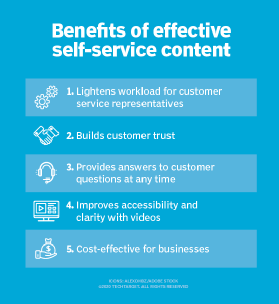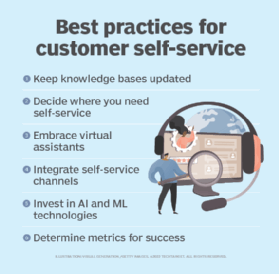What is customer self-service?
Customer self-service is digital support that lets end users access information and perform routine tasks without requiring the assistance of live agents or representatives. While traditional customer service relied on phone calls at contact centers, modern web and mobile applications integrated with artificial intelligence (AI) capabilities have simplified customer interactions and have removed the need for human agents to be involved in many tasks.
Customer self-service offers end users 24-hour support and immediate access to information without a wait for customer service representatives. The success of a customer self-service initiative depends on the quality and quantity of information available and the ease with which it's accessed. Organizations must assemble the right self-service channels for their customers and provide user-friendly systems so interactions run smoothly.
Why is customer self-service important?
Self-service empowers customers to resolve issues or complete purchases on their own. These systems provide other advantages: They let customers avoid long wait times when trying to reach service reps. Self-service also reduces the volume of interactions service reps must handle. This prevents burnout, as reps aren't as overwhelmed when websites and software handle many customer interactions.
The benefits of self-service channels can extend to an organization's bottom line. This is especially true for retail and e-commerce businesses where customer self-service facilitates everything from initial information gathering to the sale and after-sales support processes.
Self-service channels also let organizations gather data about their customers and use that information to boost customer retention. For example, tracking and analysis software can help create pseudonymous tracking profiles of users for research and targeted marketing.
Organizations save time with self-service tools, relying on them to quickly complete simple interactions. This lets live support agents focus on more complex customer issues that require human support.
Examples of customer self-service channels
Businesses use various self-service tools to create an omnichannel strategy. Customers can choose to use their preferred method of interaction as opposed to having to interact through one designated method. Customer self-service options include the following:
- Web self-service. There are multiple forms of customer self-service portals on the web. A customer can access information and perform routine tasks using knowledge base articles or FAQ pages. Community forums let customers query other customers and support staff for answers to specific questions. Additionally, tutorials and training portals empower customers to learn about products for themselves when they have questions or need to troubleshoot an issue.
- Mobile self-service. A customer can interact with a software app on a mobile device to carry out specific tasks. Apps are equipped with different functionalities, such as options for checking an account balance or transferring funds from one bank account to another.
- Interactive voice response. A customer can interact with an automated interactive voice response system to perform specific tasks, such as reporting a power outage.
- Chatbots. Automated agents are common self-service tools that can answer user queries and address concerns. Traditional rules-based chatbots are acceptable for answering predetermined, fixed lists of questions, but AI-powered bots can have free-flowing conversations with customers as they understand nuance and users' context.
- Physical self-service locations. In public spaces, a customer can perform specific self-service tasks, such as checking in at an airport. Mobile apps are seen as more efficient options for such tasks. However, many companies offer interactive kiosks equipped with virtual assistants and display screens.
Benefits and drawbacks of customer self-service
Customer self-service offers various benefits, both for customers and the organizations employing them, including the following:
- Reduced support costs. Self-service streamlines customer interactions and reduces burdens on staff so customer service teams aren't overworked. Companies might be able to save money by replacing some human agents with automation tools and letting their customer service reps spend time solving more challenging problems.

- Customer freedom. Self-service gives customers options for how they interact with a business or other organization. For example, a retail website hosting both a knowledge base and an interactive chatbot provides more than one way to inquire about a product's features.
- Constant availability. Self-service tech can help customers at any location around the world and in different time zones. Human agents are often only available during business hours in a specific time zone.
- Customer satisfaction and retention. Self-service capabilities contribute to building a good customer experience (CX) that leads to long-term customer relationships. Self-service resources should be equipped with functionality that lets customers leave feedback or access a human representative when the automated process isn't meeting their needs.
- Agent productivity. Self-service tools handle large volumes of interactions, increasing overall productivity and relieving stress on agents who no longer have to deal with high-volume interactions.
Despite these benefits, self-service channels aren't perfect tools for every customer interaction, and organizations commonly experience the following issues with them:
- Ongoing updates. Changing customer needs, plus new tools and features, mean customer support teams must continuously adjust and improve self-service support channels over time. This requires time and effort.
- Lack of human interaction. Human agents understand how to go above and beyond when offering customer service. This might mean steering a customer to a related product or providing relevant information that the customer didn't know they needed. Self-service channels aren't always able to offer a clear, customized approach to service, and human agents are still more capable of providing outstanding, nuanced service.
- Downtime. No matter how advanced self-service functionality is, outages can cause network downtime, where web and software servers or other infrastructure temporarily go offline. This interferes with self-service functions until power is restored or systems are repaired.
- User compatibility. Users have different levels of technical knowledge. Some find it easy to navigate user interfaces, while others prefer live chats with agents. Self-service platforms don't always provide the perfect option for every customer or adequate self-service support.
Customer self-service best practices
Businesses should follow a range of best practices when implementing and maintaining self-service deployments:

- Envision the customer journey. Self-service tools guide customers through their journey with a business, from first interaction to buying a product or service to post-sales interactions. The user experience shouldn't be too complicated, and customers should find what they're looking for with a few clicks.
- Decide which processes require self-service. Customer service teams still play a role in answering certain customer questions and concerns. Service teams should set up self-service tools to handle common questions and situations while providing an option for customers to easily contact service reps.
- Adopt an omnichannel approach. This flexible approach lets customers engage in self-service using whatever channel is convenient for them.
- Implement knowledge bases. A knowledge base with search functionality serves as a search engine for all products, services and information a business offers. Customers can search for what they need, when they need it.
- Invest in good tools. AI-powered chatbots and virtual assistants are useful for understanding customers' nuanced inputs and providing answers to their questions and concerns. There is a growing market for AI business intelligence tools that can analyze customer interactions to help businesses better meet their needs.
- Decide on metrics to measure success. Businesses must monitor customer success metrics, such as customer churn rate. Optimization is easier once a support team has collected feedback from its customer base. For example, customer satisfaction surveys can inform developers what changes need to be made to a product and the tools around it.
- Perform continuous updates. The final step is continuously updating self-service tools and the information they present to better meet customers' needs.
How to measure success in customer self-service
Commonly used metrics and key performance indicators (KPIs) include improved customer satisfaction and customer effort scores (CES). Customer satisfaction can be quantified in surveys and other forms of customer feedback. Negative feedback from customers about their self-service experiences identifies areas for improvement. The CES is determined when a business tracks customers' activities to see how many attempts they make to find information. A higher CES means the customer journey stages require optimization.
KPIs, such as escalation and abandon rates, can be used to assess poor or unsuccessful service. Simplicity in the customer journey should reduce the number of interactions that require escalation to human reps. High interaction rates can be a signal to service teams that they need to rethink their approach. A reduction in support tickets a customer service team creates to escalate interactions can prove a self-service strategy's success.
Abandon rates are the percentage of customers who fail to find the information or products they are looking for -- essentially, the percentage of unsuccessful customer service experiences or journeys. Businesses can better understand dissatisfied customers and customer journey problems by soliciting customer feedback that includes written comments.
The evolution of self-service, as it incorporates new technologies, shows where the future of customer experience is headed. Learn more about how digital transformation is changing CX.